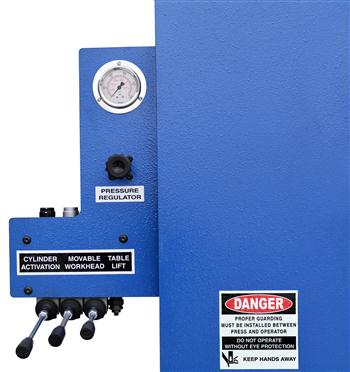Using
hydraulic presses, big or small, require some safety precautions.Operators need to get proper training, and machines need to be guarded and maintained properly. We have listed here a quick overview of basic safety rules to be observed on any shop floor.
Many types of hazard
There are four main categories of hazards that can lead to accidents while operating a
hydraulic shop press. There are the physical ones, such as pinching injuries, tripping or dropping heavy things on your feet or snapping fingers and so on. Shattering can also occur when Plexiglas dies are worked under pressure, causing shrapnel to fly out in many directions. Sharp metal can also make nasty cuts. Mechanical failures, which do not happen quite often, can also cause severe injuries. On powered presses, electrical hazards add up to the list.Hydraulic fluid and lubricant present a chemical hazard when skin contact occurs. If you’re making your own dies, liquid steel or Plexiglas, for example, may release harmful chemicals
Physical
Since the press applies multiple tons of pressure, parts can go flying in every direction in the event something gives way. Protect your eyes, you have only a pair and they cannot be replaced! Do not try to extricate anything stuck in the die with your bare hands: if it pops suddenly, you could sustain severe cuts. Fire and electrocution hazards may also occur with powered systems.
Chemicals
Some production situations require considering how chemicals can affect human health. Hydraulic fluids and lubricants can cause dermatitis if they are in contact with skin. Epoxies and liquid steel used for some dies are strong sensitizers as well. Beware of fumes and skin contact: some of the die material you are using may also be a chemical threat that causes skin problems.
Ergonomics
The press workstation needs to be adjusted to a comfortable working height. Also, work breaks are mandatory to prevent injuries. Using a hydraulic table will facilitate products loading at the comfortable height (between knee and shoulder height) while a hydraulic lift will also contribute greatly to reduce back injuries. Don’t refrain from using stands or other aids to hold pieces in the proper position.
In general…
Overall, using common sense and abiding by safety rules such as mounting your equipment properly, as recommended by your
hydraulic press manufacturer will ensure a safer working environment. It also needs to be checked and maintained regularly.Basic safety equipment in good condition such as safety goggles and protection gloves should easily available to all press operators. Oils and lubricants need to be stored according to fire safety rules as they present a fire hazard.
All injuries cannot be avoided, but at least they can be prevented.

